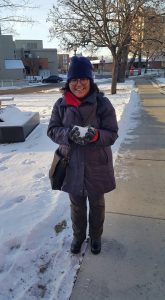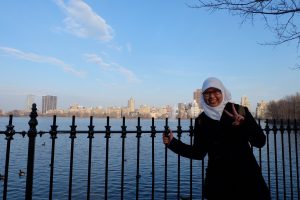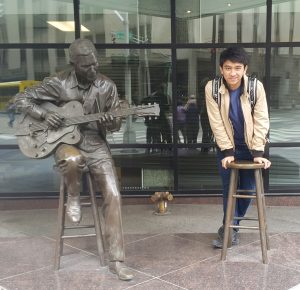Thai students reflect on U.S. Culture
Attakorn Wannawet, Minnesota State University-Mankato, Minnesota
“I really enjoyed the moment a cashier or any staff in a supermarket or a department store started a friendly conversation with me. He/she would always ask me, “Is there anything I can help you with?” or “What are you looking for, sir?”  These friendly questions make me feel cozy. When I reach a front counter for checking out, the cashier would greet me. “How are you doing?” he/she would say before doing the calculation; “Have a good day” or “Have a good night” when I reach out to leave. This way of receiving customers in the United States is hardly observed in Thailand. For me it does not matter whether they do it to appeal their customers for a business purpose since their duty is to satisfy clientele, I simply like that they try to do best on their jobs. Besides, there is another impressive thing that I want to share. “Bless you” is heard very often in my classrooms or whenever somebody sneezes. It sounds nice and interesting for me given that Thai people do not have such a particular phrase for sneezing.”
These friendly questions make me feel cozy. When I reach a front counter for checking out, the cashier would greet me. “How are you doing?” he/she would say before doing the calculation; “Have a good day” or “Have a good night” when I reach out to leave. This way of receiving customers in the United States is hardly observed in Thailand. For me it does not matter whether they do it to appeal their customers for a business purpose since their duty is to satisfy clientele, I simply like that they try to do best on their jobs. Besides, there is another impressive thing that I want to share. “Bless you” is heard very often in my classrooms or whenever somebody sneezes. It sounds nice and interesting for me given that Thai people do not have such a particular phrase for sneezing.”
Chayapimon Aunruan, St. Cloud State University, Minnesota
“The first impression I have here is the kindness and friendliness of American people.  Most of them always greet me with smile even if we don’t know each other. It makes me feel comfortable. For instance, while I was walking back to my dorm, there was a girl who was about to pass me. She greeted me, so I greeted her back. We talked for about 5-10 minutes about weather and university life. She is very friendly, and now she is a good friend of mine. Moreover, when you have problems, and you ask Americans for help, they will help you as much as they can. For example, my friend and I got lost in L.A., so we asked an American man about the location and the hotel where we stayed. He was willing to help us by searching for the location from his GPS and navigated us all the information we needed to go to the hotel, and then he said good luck.”
Most of them always greet me with smile even if we don’t know each other. It makes me feel comfortable. For instance, while I was walking back to my dorm, there was a girl who was about to pass me. She greeted me, so I greeted her back. We talked for about 5-10 minutes about weather and university life. She is very friendly, and now she is a good friend of mine. Moreover, when you have problems, and you ask Americans for help, they will help you as much as they can. For example, my friend and I got lost in L.A., so we asked an American man about the location and the hotel where we stayed. He was willing to help us by searching for the location from his GPS and navigated us all the information we needed to go to the hotel, and then he said good luck.”
Muna Chema, Chatham University, Pennsylvania
“20 hours of community service seems to be a difficult task for me since I haven’t done it much even in Thailand. I was not an activist at all (but I always wanted to be). Therefore, my first time in the United States will be the first step for me to challenge myself and do something that I’d never done before, and guess what? It is a wonderful beginning! I really enjoy doing community service. My favorite community service is to be a mentor and tutor for a student in magnet school. It was very tough to deal with a 4th grade kid since I never had experience of being a mentor, and sometimes the kid didn’t even care that I was there for her. It was tiring but also a great experience.  Besides from being mentor, I also participated in various services like lunch packing for homeless people, serving food for homeless people, etc. There are more than 500,000 homeless in America, and most of them have a mental problem. I was afraid of homeless people as I thought that they are dangerous. However, after I had participated in many services and could interact with those people, I have realized that what I thought was totally wrong. Homeless people are not someone to be afraid of but to be helped and taken care of by us. I could not tell all of my story here but I could say that this scholarship has given me a great opportunity to experience the bigger world and opened my eyes as well as my heart to have more compassion and make a change to our world.”
Besides from being mentor, I also participated in various services like lunch packing for homeless people, serving food for homeless people, etc. There are more than 500,000 homeless in America, and most of them have a mental problem. I was afraid of homeless people as I thought that they are dangerous. However, after I had participated in many services and could interact with those people, I have realized that what I thought was totally wrong. Homeless people are not someone to be afraid of but to be helped and taken care of by us. I could not tell all of my story here but I could say that this scholarship has given me a great opportunity to experience the bigger world and opened my eyes as well as my heart to have more compassion and make a change to our world.”
Patompong Savaengsuk, Tennessee Tech University, Tennessee
“I’m really surprised with the way a waiter serves customers in the restaurant.  The waiter always comes to me and asked if everything is okay every 10 minute even though it’s not a big restaurant. Another thing that surprised me is that people often say “excuse me” or “sorry” even though it’s not the big deal, for example, I want to enter a room while there is a man who walks out of that room before I get inside, and then he said “excuse me” to me. I don’t even know why he needs to say that, I didn’t even get bothered or feel anything negative from him. The funny thing is that now I get used to it, and I start to use it myself. I say the words when I walked through a group of people talking or the door case. I think it’s a good thing since it’s a sign of politeness.”
The waiter always comes to me and asked if everything is okay every 10 minute even though it’s not a big restaurant. Another thing that surprised me is that people often say “excuse me” or “sorry” even though it’s not the big deal, for example, I want to enter a room while there is a man who walks out of that room before I get inside, and then he said “excuse me” to me. I don’t even know why he needs to say that, I didn’t even get bothered or feel anything negative from him. The funny thing is that now I get used to it, and I start to use it myself. I say the words when I walked through a group of people talking or the door case. I think it’s a good thing since it’s a sign of politeness.”